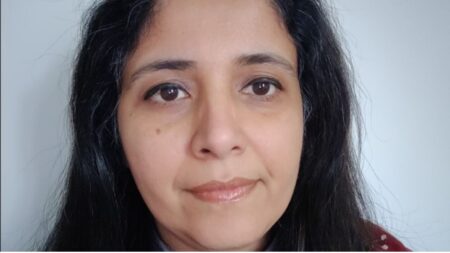Action plan for a green future

Schools group GDST’s sustainability action plan is preparing and empowering girls to tackle the climate emergency, says Anu Sabherwal
The GDST schools group has been a carbon neutral organisation since 2021 and as part of our 150th anniversary celebrations, we launched our ‘One’ strategy in 2022 to reaffirm our long-standing sustainability commitment. The key message, ‘One World, One Future, One Chance’ showcases our collective efforts to align with the UK’s national targets of becoming net zero carbon by 2050. Rising to the challenges set out in the Department for Education’s sustainability and climate change strategy, we are implementing the GDST sustainability action plan across all our schools.
The three key commitments that form our GDST-wide sustainability action plan are: educate and empower, sustainable behaviour, and being carbon neutral. Our action plan focuses on the UN Sustainable Development Goals we can actively influence, ranging from health and wellbeing, gender equality, quality education, community climate action and reduction of our physical carbon footprint.
We encourage joined-up thinking, collaboration and partnerships across our family of 25 GDST schools on many sustainability initiatives. Our climate action efforts evolve and improve every year based on lessons learnt from measuring the outcomes of previous initiatives. Through our carbon reduction plan, we measure our annual scope 1, 2 and 3 emissions from our estates, educational activities and our school communities to help inform our decisions for future carbon reduction opportunities.
Educating and empowering students and staff
As educators, we have a responsibility to teach our pupils about the science of climate change and equip them to become current and future leaders driving positive climate action. This is why we have embedded holistic sustainability and climate change education throughout our school curriculum and wider activities.
The GDST energy programme for instance, aims to educate and empower our teachers, facilities staff and pupils with current sustainability knowledge. Pupils and teachers apply a scientific inquiry method to analyse their school’s actual energy data, which informs initiatives that encourage behavioural change and reduce energy usage, thereby reinforcing a culture of sustainable and responsible consumption. As part of this programme, last year several GDST schools participated in an insightful sustainability event hosted by University College London at its MechSpace building. The girls explored how innovative science-based approaches are helping to overcome complex sustainability challenges and demonstrated great curiosity and enthusiasm in interacting with many inspirational sustainability professionals.
We also provide our teachers and support staff with the knowledge and skills to embed successfully sustainability and climate change education into the curriculum. A rich and diverse range of courses, webinars, forums and conferences are on offer throughout the year, as well as opportunities to gain professional qualifications through GDST’s in-house staff training programme GDST Learn. This year’s ‘How green is my school?’ training session, led by UCL’s Sarah Sharp focused on evaluating and improving school sustainability practices. Dr Amanda Power from St Catherine’s College, Oxford, guided participants at our history collaboration conference on ways to integrate climate topics into the history curriculum.
Promoting sustainable behaviour across our schools
Education can facilitate behaviour change, which is why promoting sustainable behaviours is a key part of our trust-wide sustainability action plan. Sustainability lead teachers and eco-committees across our schools meet regularly to exchange ideas and implement many environmental initiatives that address the UN Sustainable Development Goals.
This year, Portsmouth High School won the EduCCate Global Bronze Award for being a centre of excellence for sustainability, with members of staff training to minimise the school’s carbon footprint and improve the climate literacy of the whole school community. Additionally, it renewed its Eco-Schools Green Flag Award, a national initiative that encourages young people to consider climate action in their everyday lives, with distinction this year.
Brighton Girls’ and Blackheath High School are both pioneering the latest 3D printing technology to repurpose plastic bottles into pots for plants that bring benefits of nature indoors, improve indoor air quality while helping divert waste from landfill. Brighton Girls’ design and innovation department has been awarded a grant for its groundbreaking ‘FutureGirlsDesign’ project, which integrates circular economy principles within the curriculum and promotes sustainable practices by incorporating the school’s plastic waste streams into innovative, practical projects across different year groups.
Eco-warriors at Kensington Prep School are also working towards the school’s plastic-free status (an accreditation from Surfers Against Sewage) with the aim of eliminating single-use plastic in the school. A ‘trash mob’ that collected litter from the school grounds for analysis, revealed that packaging from local supermarket products is not always recyclable. Based on this evidence, the eco-warriors sent letters to these companies to enquire about their plans to use more sustainable packaging.
Other schools such as Royal High School Bath and Howell’s School, Llandaff, are supporting nature and biodiversity with sustainable beekeeping, conserving local ecology and establishing nature biodiversity corridors across the school campuses to support local fauna habitats and migratory routes. Streatham and Clapham High School also supports biodiversity by maintaining a plant nursery, going paperless and is planning to keep beehives this year. It regularly pushes suppliers to provide eco-friendly services and implements energy efficiency controls to have the lowest energy use per floor area, proving that sustainable choices can achieving significant cost savings.
GDST’s Belvedere Academy’s eco group promotes recyclable and biodegradable equipment within its canteens to reduce use of plastics within the school. The group also encourages staff and pupils to switch off devices before the end of the day and over school holidays, and measure the impact of these actions in reducing the carbon footprint of their school. Belvedere has been successful in optimising its buildings’ energy use and is now one of the most energy-efficient schools in the GDST group.
Several of our schools such as Blackheath, Oxford and South Hampstead also hold inter-school student sustainability conferences and eco-weeks to explore different aspects of sustainability and climate action, as well as engage with future career opportunities presented by external speakers. Last year, Northwood College for Girls also hosted a mock COP 29 event in collaboration with local schools.
Decarbonising our estate to transition to net zero
We are actively decarbonising our existing estate through continued development and upgrade projects. Every single project is carefully considered and approached in a purposeful manner to reduce our carbon emissions. Our decarbonisation strategies – which include energy-efficiency upgrades, solar renewable energy installation and high-performance building fabric upgrades – are being implemented in new capital projects as well as long-term maintenance upgrades.
We now procure 100% renewable electricity and have installed energy efficient LED light fittings across all our 25 schools. Through GDST’s estate-wide solar programme, Northwood College has seen a 21% reduction in its electricity bills using self-generated solar energy, and Oxford High also expected to see a similar 20% reduction. We are working hard to move away from fossil fuels towards green energy sources in a phased manner.
Our continuing investment in upgrading the GDST estate creates high-quality learning environments and also helps to reduce the carbon footprint of our school buildings substantially. Our improvement projects embody best practice in design of the built environment and supports the nation’s net zero carbon targets.
As an example, February 2024 saw the opening of Notting Hill & Ealing’s new junior school building that is built with a sustainable timber frame, helping reduce the embodied carbon of the school building. Solar photovoltaic panels on the roof supply green, renewable electricity while the design of roof lights in classrooms bring in diffused natural daylight that supports the occupants’ wellbeing while reducing energy use. A highly insulated and airtight building envelope, and a low-energy heat recovery system with air source heat pumps that reuse waste heat, keep the building warm, while fresh air circulates through acoustically insulated natural vents that reduce unwanted outdoor noise. All of this contributes to the building being 40% more energy efficient compared to the old junior school building. It also meets the BREEAM excellent sustainability standards and LETI design guidelines.
Long-term maintenance projects on some of our most historic, Grade II listed school buildings include Royal High School Bath, Howell’s School, Llandaff and Sheffield Girls’. We meticulously restored their building envelopes to retain historic architectural character while at the same time improving their energy-efficiency performance through window replacements (where allowed) and upgrading old services and controls, thereby rejuvenating the buildings to be fit for purpose for many more years to come.
Our journey towards a net zero carbon future it is the early stages, but I am already so proud of everyone across the GDST who lives and breathes our collective sustainability goals. We are all equally committed and engaged with finding new ways to improve and track the tangible reductions in our carbon emissions. Sustainability is a green thread that is woven through everything we do at the GDST, and we remain committed to encouraging and championing behaviours within our schools that protect, nurture and enhance the health and wellbeing of our people and our planet alike.
Anu Sabherwal is head of sustainability and infrastructure at GDST

Anu Sabherwal
